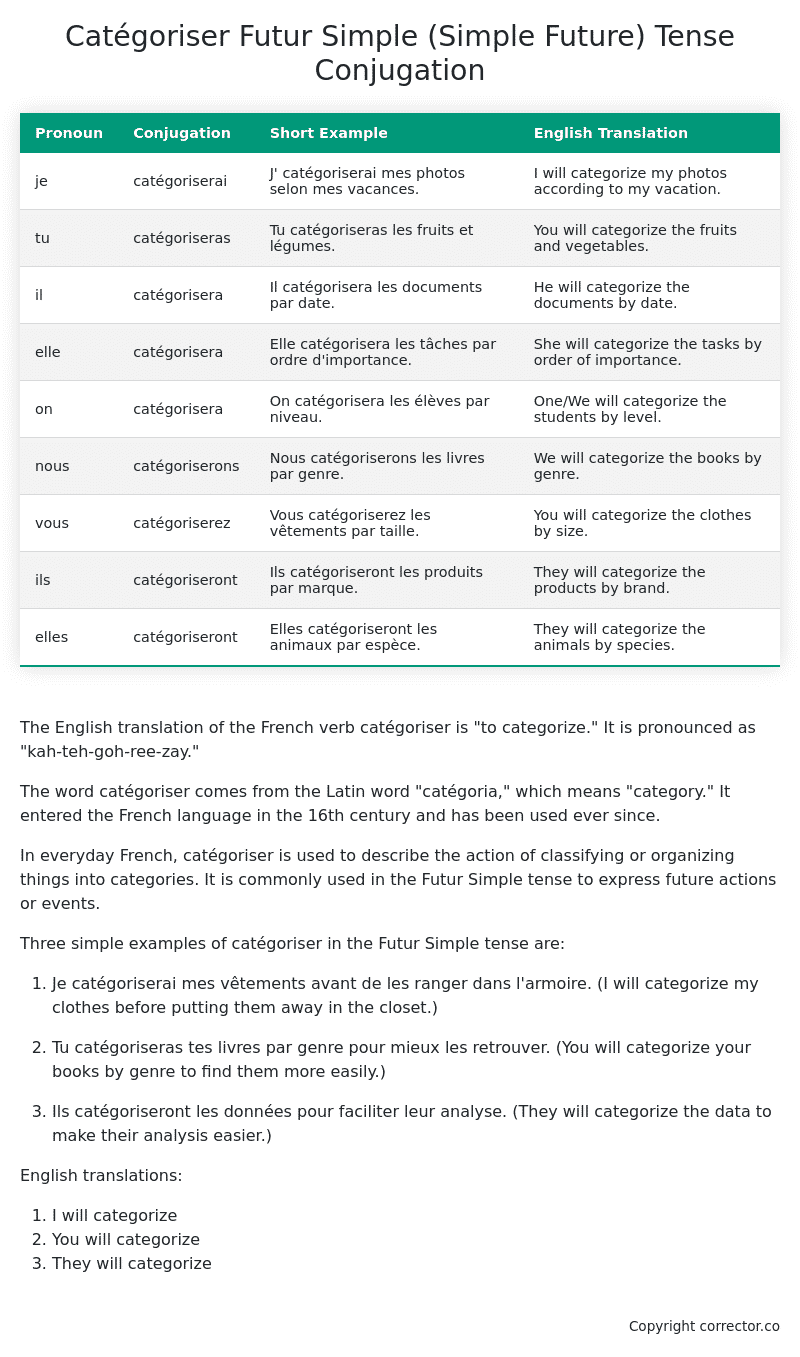Futur Simple (Simple Future) Tense Conjugation of the French Verb catégoriser
Introduction to the verb catégoriser
The English translation of the French verb catégoriser is “to categorize.” It is pronounced as “kah-teh-goh-ree-zay.”
The word catégoriser comes from the Latin word “catégoria,” which means “category.” It entered the French language in the 16th century and has been used ever since.
In everyday French, catégoriser is used to describe the action of classifying or organizing things into categories. It is commonly used in the Futur Simple tense to express future actions or events.
Three simple examples of catégoriser in the Futur Simple tense are:
-
Je catégoriserai mes vêtements avant de les ranger dans l’armoire. (I will categorize my clothes before putting them away in the closet.)
-
Tu catégoriseras tes livres par genre pour mieux les retrouver. (You will categorize your books by genre to find them more easily.)
-
Ils catégoriseront les données pour faciliter leur analyse. (They will categorize the data to make their analysis easier.)
English translations:
- I will categorize
- You will categorize
- They will categorize
Table of the Futur Simple (Simple Future) Tense Conjugation of catégoriser
| Pronoun | Conjugation | Short Example | English Translation |
|---|---|---|---|
| je | catégoriserai | J’ catégoriserai mes photos selon mes vacances. | I will categorize my photos according to my vacation. |
| tu | catégoriseras | Tu catégoriseras les fruits et légumes. | You will categorize the fruits and vegetables. |
| il | catégorisera | Il catégorisera les documents par date. | He will categorize the documents by date. |
| elle | catégorisera | Elle catégorisera les tâches par ordre d’importance. | She will categorize the tasks by order of importance. |
| on | catégorisera | On catégorisera les élèves par niveau. | One/We will categorize the students by level. |
| nous | catégoriserons | Nous catégoriserons les livres par genre. | We will categorize the books by genre. |
| vous | catégoriserez | Vous catégoriserez les vêtements par taille. | You will categorize the clothes by size. |
| ils | catégoriseront | Ils catégoriseront les produits par marque. | They will categorize the products by brand. |
| elles | catégoriseront | Elles catégoriseront les animaux par espèce. | They will categorize the animals by species. |
Other Conjugations for Catégoriser.
Le Present (Present Tense) Conjugation of the French Verb catégoriser
Imparfait (Imperfect) Tense Conjugation of the French Verb catégoriser
Passé Simple (Simple Past) Tense Conjugation of the French Verb catégoriser
Passé Composé (Present Perfect) Tense Conjugation of the French Verb catégoriser
Futur Simple (Simple Future) Tense Conjugation of the French Verb catégoriser (this article)
Futur Proche (Near Future) Tense Conjugation of the French Verb catégoriser
Plus-que-parfait (Pluperfect) Tense Conjugation of the French Verb catégoriser
Passé Antérieur (Past Anterior) Tense Conjugation of the French Verb catégoriser
Futur Antérieur (Future Anterior) Tense Conjugation of the French Verb catégoriser
Subjonctif Présent (Subjunctive Present) Tense Conjugation of the French Verb catégoriser
Subjonctif Passé (Subjunctive Past) Tense Conjugation of the French Verb catégoriser
Subjonctif Imparfait (Subjunctive Imperfect) Tense Conjugation of the French Verb catégoriser
Conditionnel Présent (Conditional Present) Tense Conjugation of the French Verb catégoriser
Conditionnel Passé (Conditional Past) Tense Conjugation of the French Verb catégoriser
L’impératif Présent (Imperative Present) Tense Conjugation of the French Verb catégoriser
L’infinitif Présent (Infinitive Present) Tense Conjugation of the French Verb catégoriser
Struggling with French verbs or the language in general? Why not use our free French Grammar Checker – no registration required!
Get a FREE Download Study Sheet of this Conjugation 🔥
Simply right click the image below, click “save image” and get your free reference for the catégoriser Futur Simple tense conjugation!

Catégoriser – About the French Futur Simple (Simple Future) Tense
Formation of Futur Simple
For regular -er verbs (e.g., parler – to speak)
For regular -ir verbs (e.g., finir – to finish)
For regular -re verbs (e.g., vendre – to sell)
Common Everyday Usage Patterns
Conditional Statements
Interactions with Other Tenses
Futur Antérieur
Conditional
Present
Summary
I hope you enjoyed this article on the verb catégoriser. Still in a learning mood? Check out another TOTALLY random French verb conjugation!


